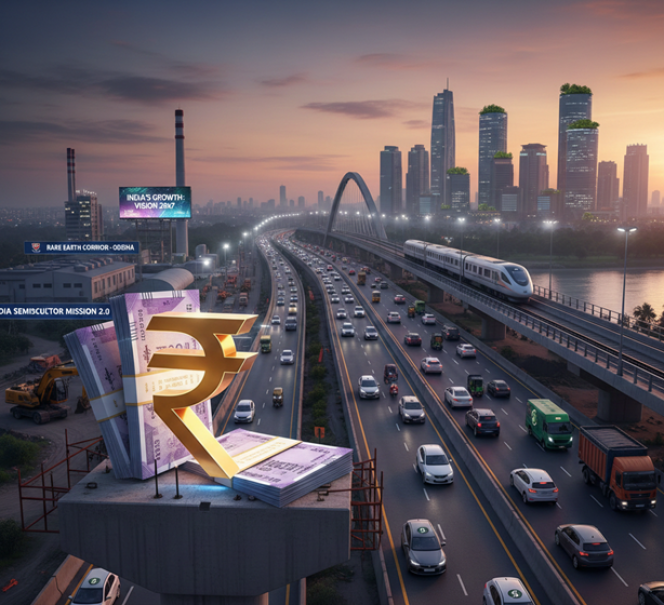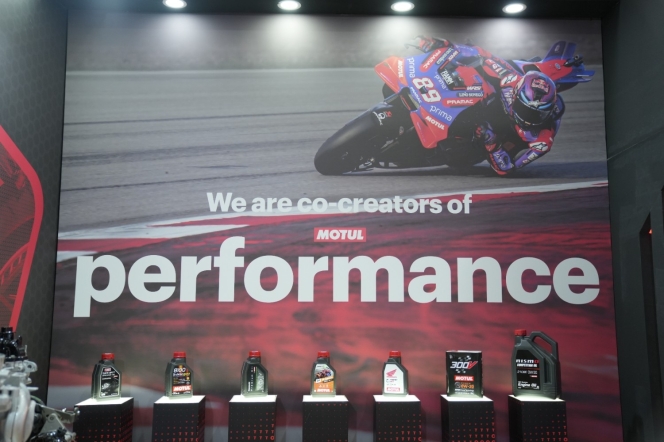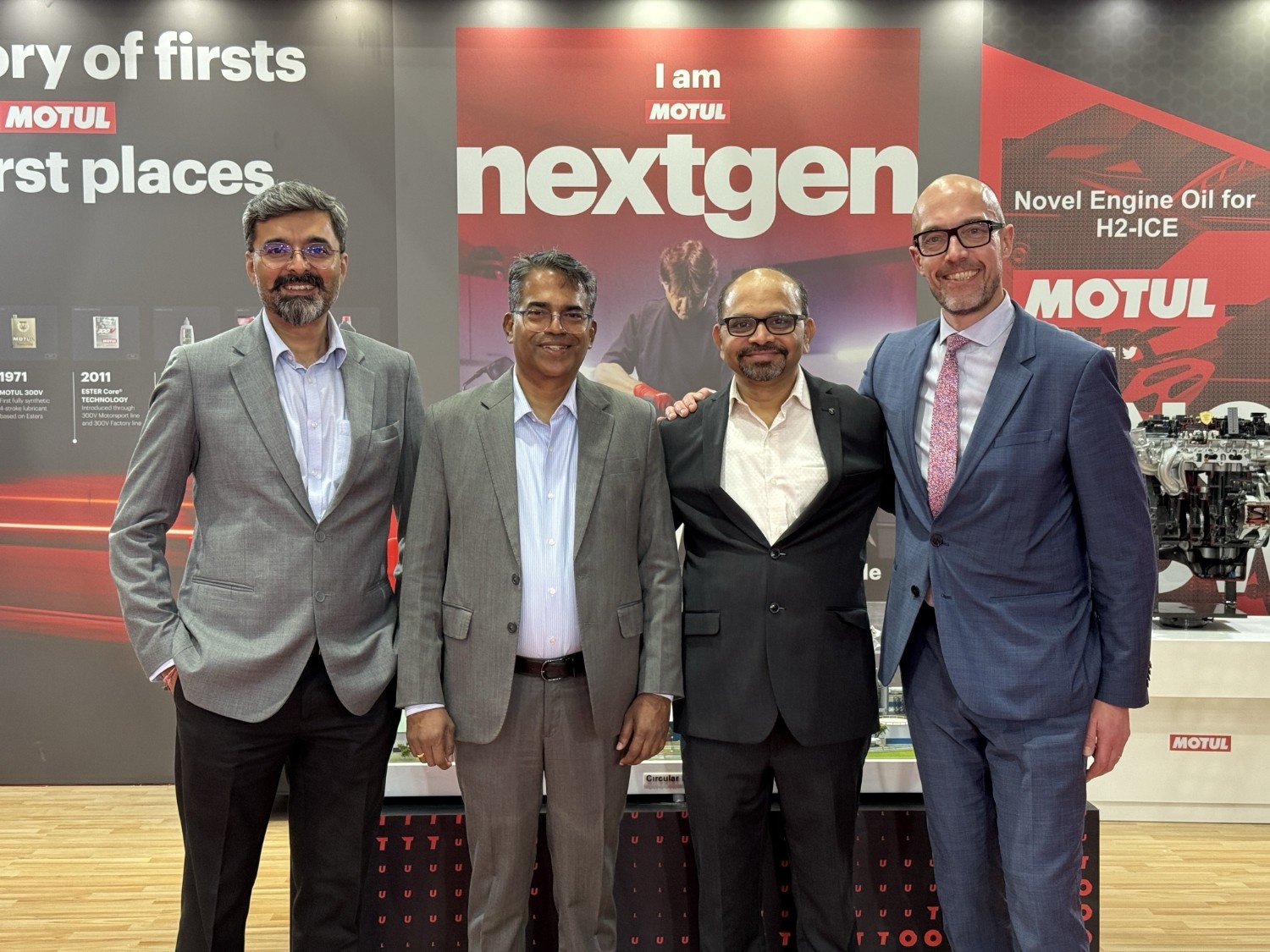- Budget 2025
- post budget reaction
- auto industry
- EV
- leaders
- manufacturing sector
- automotive
- production
- engineering
- mechanical
- electrical
- electronics
Union Budget 2025-26: A Game-Changer for Electric Mobility, Start-ups And MSMEs
- By Gaurav Nandi
- February 04, 2025

The Union Budget 2025-26 has been widely welcomed by industry leaders, particularly for its transformative impact on the electric mobility and start-up ecosystems. Key highlights include the exemption of basic customs duty (BCD) on 35 capital goods critical for EV battery manufacturing and tax exemptions on essential materials like lithium and cobalt, significantly lowering production costs and promoting local supply chains.
The budget also emphasised boosting the MSME sector through increased credit access and skill development, alongside measures supporting startups, gig workers and cleantech manufacturing. Investments in infrastructure, public-private partnerships and tax relief for the middle class are expected to stimulate consumer spending and economic growth.
Overall, the budget is seen as a strong step toward making India a global leader in sustainable mobility, innovation and self-reliant manufacturing.
Partner and Automotive Tax Leader at EY India Saurabh Agarwal noted, “The proposed income tax cuts could boost the middle class's spending power, potentially increasing demand for two-wheelers, three-wheelers, and small cars. Further, the government's commitment to fostering a sustainable automotive ecosystem is clearly demonstrated through its strategic initiatives, which are poised to deliver substantial benefits to the EV industry. The budget astutely emphasizes the complete exemption of Basic Customs Duty (BCD) on cobalt powder and waste, scrap of lithium-ion battery, lead, zinc, zirconium, copper, etc. These pivotal measures are designed to ensure a reliable domestic supply of essential critical minerals for manufacturing and to stimulate job creation across India.”
The Central Government has significantly increased budgetary allocations with PME E-Drive receiving INR 40 billion, auto PLI being bolstered by INR 22.18 billion and advanced chemistry cell PLI benefiting from an infusion of INR 1.55 billion.
Commenting on the newly introduced budget, Mercedes-Benz India Managing Director Santosh Iyer said, “India has long been regarded as a niche garden with high fences; however, this budget is expected not only to enrich the garden by stimulating consumption and strengthening MSME sector, but also lowering the fences through tariff rationalisation and adoption of international practices on transfer pricing, with a clear commitment to enhanced global trade integration. This will send a strong positive signal to the industry, reinforcing confidence in the ‘India Growth Story’, paving the way for sustained investment and future expansion. The announcement of setting up of National Manufacturing Mission’s for clean technology manufacturing and support to domestic EV battery manufacturing is a positive step towards strengthening EV ecosystem. We also welcome the setting up of a high-level committee to evaluate regulatory reforms which will enhance ease of doing business in long term.”
Volkswagen India Brand Director Ashish Gupta, averred, “The Union Budget presents a forward-thinking roadmap for strengthening India’s manufacturing ecosystem with a clear emphasis on clean technology, skill development and infrastructure growth. By prioritizing these areas, along with manufacturing, India is advancing toward a circular economy—where investments, innovation, and sustainable practices drive long-term growth. Infrastructure growth through public-private partnerships and capital expenditure incentives will pave the way for India to become a globally competitive manufacturing hub.”
Commercial vehicle players have also lauded the budget. Ashok Leyland Executive Chairman Dheeraj Hinduja noted, “The finance minister has presented a clear, growth-driven budget that aligns with the Prime Minister’s vision of fostering a competitive and resilient India with inclusive growth by investing in people, economy and innovation. Additionally, the government's strong commitment to green mobility is expected to create new avenues for innovation and growth across the country.”
Daimler India Commercial Vehicles Managing Director Satyakam Arya iterated, “The Union Budget 2025-26 will be a game changer for India and the mobility sector, helping us become a global leader in EV manufacturing and sustainable transportation. The emphasis on localising battery production will create technological advancements and generate more jobs. Also, with mining identified as one of the six domain areas for transformative reforms and the introduction of the State Mining Index, we see major growth potential for the sector in the coming years.”
EKA Mobility Chairman Sudhir Mehta said, “These different programmes demonstrate a strong commitment to sustainability, innovation and greater industrial competitiveness, setting the framework for transformative progress in a variety of critical sectors. The nation's energy revolution will be dependent on funding for small modular reactors and the government's target of 100 gigawatts of nuclear power by 2047. Long-term growth can be solidified by financial agreements that allow governments to expand their borrowing capacity, as well as indirect taxation initiatives targeted at increasing domestic value creation.”
Two-wheeler industry
In a move to avoid protectionist signals, the government has reduced import duties on high-end motorcycles. This decision aligns with India's commitment to lowering trade barriers and could influence the premium motorcycle segment.
With electric mobility remaining the focus point of the automotive sector, the budget has made pivotal efforts for bolstering manufacturing. Drawing on that, companies operating in the EV two-wheeler space has welcomed the developments with open arms.
Kolkata-based Motovolt Mobility Founder Tushar Choudhary said, “"The recent budget has delivered a promising outlook for India’s electric vehicle industry, especially with the reduction in BCD on capital goods related to EV manufacturing. This move will help lower production costs, making EVs more affordable for consumers and encouraging higher sales. Aligned with the National Manufacturing Mission, the budget’s focus on rationalising customs tariffs signals the government's intent to localize high-value production and reduce dependency on imports. Additionally, the exemption on critical minerals like lithium is a significant step toward easing the supply of vital components for EV batteries, further lowering costs and boosting domestic manufacturing. Efforts to localize EV components like batteries, motors and controllers will help reduce upfront costs which would further strengthen India’s EV Ecosystem giving the EV sector the ability to penetrate the Indian markets.”
Chennai-based high performance EV two-wheeler manufacturer Raptee HV’s Co-founder Dinesh Arjun said, “The Finance Minister’s focus on nurturing and investing in innovation is a commendable step toward accelerating new technologies that will shape our future. The allocation of a Deep Tech Fund will further strengthen India’s industrial ecosystem, fostering a globally competitive, tech-driven economy.”
Drawing on the same lines, Revamp Moto Chief Executive Officer Pritesh Mahajan said, “"The National Manufacturing Mission’s support for clean tech manufacturing is a game-changer for India's sustainable future. I firmly believe that this initiative will accelerate the growth of domestic EV battery and solar panel production, reducing our reliance on imports while strengthening India's position as a global leader in green technology. The additional INR 100 billion investment underscores the government’s commitment to fostering innovation, job creation and energy security.”
Welcoming the budget, Odysse Electric Founder Nemin Vora said, “We appreciate the Union Budget 2025, which underscores the government's commitment to fostering economic growth and empowering citizens. The adoption of progressive policies, particularly within the existing tax framework, is a key step in enhancing disposable income and driving consumer spending. This decision will significantly impact consumer-driven sectors, especially the two-wheeler industry. With more disposable income in the hands of consumers—particularly the middle class—purchasing power is set to rise. As a result, more individuals will be encouraged to invest in personal mobility solutions like two-wheelers.”
Associates talk
The boost towards electric mobility is also poised to impact the entire ecosystem. DriveX Founder Narain Karthikeyan noted, “The 2025 Budget is a strong step towards inclusive economic growth, bringing significant benefits across all sections of society. The increase in MSME turnover limits, along with enhanced credit access and intensive skill-development programmes will fuel entrepreneurship, business expansion and youth employment. We also welcome the government’s recognition of the gig economy, with steps to regularise support for gig workers and improve their access to credit facilities. With enhanced credit guarantee cover for MSMEs and startups, particularly in focus sectors crucial for Atmanirbhar Bharat, the budget lays a strong foundation for sustained growth and economic resilience.”
Commenting on the same lines, Taabi Mobility Limited Chief Executive Officer Pali Tripathi said, “The transformation of India Post into a large-scale logistics network, along with greater accessibility to PM Gati Shakti data for the private sector, will significantly enhance connectivity, particularly in hinterland regions. These initiatives will drive smarter freight management, optimise last-mile delivery, and make transportation more seamless and sustainable.”
On the aggregator front Rapido Chief Financial Officer Vivek Krishna said, “The Union Budget 2025-26 has proposed a review of both financial and non-financial sector regulations that are expected to help businesses perform better with lesser compliances. It reflects a bold vision for Viksit Bharat, one that empowers the gig economy, promotes sustainable mobility, and catalyses digital innovation. We welcome the social security scheme and healthcare support announced for gig workers. The e-shram portal registration and the PM Jan Arogya Yojana will be a game-changer in prioritising the well-being of gig workers, including our captains. It’s also encouraging to see the government’s effort in promoting green mobility by incentivising local EV component manufacturing.”
Alluding to how the manufacturing push will bolster the electric mobility segment, Kinetic Engineering Managing Director Ajinkya Firodia said, “These steps noted in budget will significantly enhance India’s position as a global hub for electric mobility and clean energy technologies. In addition, the focus on expanding charging infrastructure, incentivising electric buses for public transport and ramping up domestic battery production marks a decisive move in India’s EV revolution. The continued subsidies under the FAME scheme will make EVs more affordable and accessible to consumers. This strong policy push not only paves the way for rapid adoption of EVs but will also create jobs, reduce dependence on fossil fuels and position India as a global leader in sustainable transportation.”
Drawing on the same lines, Tata Technologies Managing Director Warren Harris said, “The establishment of five National Centres of Excellence for Skilling is a pivotal move in building a future-ready workforce. This initiative resonates with our commitment to engineering a better future for India's youth through investment in in-demand training programs across Industry 4.0, IoT, and advanced manufacturing and collaborating with state governments to upgrade ITIs into technology hubs.”
TapFin Co-founder Aditya Singh said, “The budget’s emphasis on cleantech manufacturing, including incentives for electric vehicle batteries and the additional 10 GW support for grid-scale batteries, signals a significant shift for India’s electric mobility sector. Strengthening domestic production will foster innovation, reduce dependence on imports, and open new growth opportunities.”
Image for representative purpose only
- January 2026
- sales
- Hero MotoCorp
- TVS Motor Company
- Royal Enfield
- B Govindarajan
- Eicher Motors
- Mahindra & Mahindra
- Tata Motors Passenger Vehicles
- Hyundai Motor India
- Toyota Kirloskar Motor
- JSW MG Motor India
- Kia India
- Tarun Garg
- Nalinikanth Gollagunta
- Atul Sood
- Tata Motors Commercial Vehicles
Indian Automotive Sector Starts 2026 With Robust January Wholesales Growth
- By MT Bureau
- February 01, 2026

The Indian automotive industry has commenced the 2026 calendar year on a high note, with automakers across two-wheeler, passenger vehicle and commercial vehicle segments reporting significant YoY wholesale growth for January. The performance reflects a resilient domestic market and a burgeoning recovery in international exports.
The two-wheeler sector saw massive volume gains, spearheaded by Hero MotoCorp, which recorded dispatches of 557,871 units, marking a robust 26 percent growth compared to 442,873 units in January 2025. This performance marks the company’s 25th consecutive year of market leadership. TVS Motor Company followed with a 30 percent increase in domestic two-wheeler sales, reaching 383,262 units, while its electric vehicle (EV) wing grew by 50 percent to 37,756 units.
Royal Enfield achieved a significant milestone, surpassing 1 million year-to-date sales in just 10 months, posting January sales of 104,322 motorcycles – a 14 percent YoY increase, which includes 93,781 units in the domestic market and 10,541 units exported.
B. Govindarajan, Managing Director, Eicher Motors and CEO, Royal Enfield, said, "The new year has begun on a positive note for Royal Enfield – extending the strong momentum from the previous quarter and marking four consecutive months of healthy double-digit growth. We have crossed 1 million motorcycle sales in this financial year across the globe and also crossed 100,000 motorcycle sales in exports."
In the passenger vehicle (PV) segment, Mahindra & Mahindra reported a 25 percent growth in utility vehicles, selling 63,510 units domestically. Tata Motors Passenger Vehicles saw a dramatic 47.1 percent rise in total sales (including EVs) to 71,066 units.
Hyundai Motor India achieved its highest-ever monthly domestic sales of 59,107 units, up 9.5 percent, while Toyota Kirloskar Motor registered 30,630 units, representing a 17 percent YoY growth. Kia India also started the year strong with 27,603 units, a 10.3 percent increase and JSW MG Motor India grew 9 percent with 4,843 wholesale units.
Honda Cars India reported domestic wholesales of 6,193 units and 748 units in exports. These figures follow a January 2025 performance where the company registered 7,325 domestic units and 4,979 units in exports.
The current sales volume is supported by demand for the Honda Amaze, alongside steady contributions from the City and Elevate models.
Tarun Garg, MD & CEO, Hyundai Motor India, said, "January 2026 marks a defining chapter in Hyundai Motor India’s journey. Achieving our highest-ever monthly domestic sales of 59,107 units... reflects not only Hyundai’s brand leadership but also the collective strength of our people, partners and customers."
Nalinikanth Gollagunta, CEO, Automotive Division, Mahindra & Mahindra, said, "Building on the strong momentum of last year's performance, we began the year on a strong note in January... On 14th January, we opened bookings for XUV7XO and XEV 9S clocking 93,689 bookings for a booking value of INR 205 billion - a record-breaking milestone in just 4 hours."
Atul Sood, Senior Vice-President, Sales & Marketing, Kia India, said, "The encouraging start to 2026 reflects the continued trust customers place in the Kia brand. The positive response to the new-generation Seltos, steady demand for the Sonet, and growing popularity of the Carens Clavis and Clavis EV, underline the strength and balance of our portfolio."
Kunal Behl, Vice President, Marketing & Sales, Honda Cars India Ltd, said: “The year has begun on a strong note, supported by a healthy sales momentum. The Honda Amaze continues to bring in strong demand for its value for money offering along with the City and Elevate that contribute steadily to the overall business. We remain confident of sustaining this positive momentum in the coming months.”
The commercial vehicle (CV) sector also demonstrated strength, particularly in heavy and light cargo segments. Tata Motors reported total CV sales of 38,844 units, up 29.1 percent from 30,083 units in the previous year. Within this, Heavy Commercial Vehicle (HCV) trucks saw the sharpest rise at 41.2 percent. Mahindra’s domestic CV sales grew by 22 percent to 27,656 units, driven largely by the LCV 2T–3.5T category.
Union Budget 2026-27: Supply Chain Resilience, Infra Push To Drive Auto Industry Growth
- By MT Bureau
- February 01, 2026

In a strategic pivot from direct consumer subsidies to foundational supply-chain resilience, the 2026-27 Union Budget, presented by Finance Minister Nirmala Sitharaman, focuses on bolstering the structural integrity of the Indian automobile industry.
A cornerstone of this year’s fiscal policy is the massive infrastructure and logistics push, highlighted by the development of the Dankuni-Surat Dedicated Freight Corridor and the operationalisation of 20 new national waterways. These initiatives, alongside a coastal cargo promotion scheme aiming to double the share of waterway freight to 12 percent by 2047, are designed to drastically lower logistics costs and ease the movement of components across the country.
Simultaneously, the government is reinforcing the industry's backbone by establishing a INR 100 billion SME Growth Fund to provide long-term capital for auto-component MSMEs, while enhancing liquidity through the Trade Receivables Discounting System (TReDS) and easing regulatory hurdles via ‘Corporate Mitras’ in Tier-II and Tier-III cities.
To secure the future of high-tech mobility, the Budget further expands the India Semiconductor Mission (ISM 2.0) to include domestic equipment manufacturing and chip IP, while nearly doubling the allocation for the Electronics Components Manufacturing Scheme to INR 400 billion. This technological drive is matched by a robust commitment to the electric vehicle (EV) ecosystem, specifically through the creation of ‘rare earth corridors’ in Odisha, Kerala, Andhra Pradesh and Tamil Nadu. These hubs will provide plug-and-play ecosystems to insulate the industry from global mineral volatility and supply curbs. Complementing this is a series of customs duty exemptions on capital goods used for lithium-ion cell manufacturing and critical mineral processing, which is expected to drive down battery costs and encourage local gigafactory expansion. Finally, for the clean energy segment, the full excise duty exemption on the biogas portion of blended CNG offers immediate relief to fuel prices, marking a comprehensive effort to foster a self-reliant, sustainable, and cost-competitive automotive landscape in the wake of previous GST reforms.
Motul Charts Future Of Mobility With Advanced Fluids At SIAT Expo 2026
- By MT Bureau
- January 31, 2026

Motul India presented a comprehensive vision for the future of automotive fluids at SIAT Expo 2026, centred on innovation, sustainability and supporting the industry’s technological transition. The company’s exhibition was built around the event’s core theme of pioneering safe and sustainable mobility, demonstrating a strategic commitment to evolving alongside new vehicle architectures.
A cornerstone of this vision is the development of fluids for new propulsion systems. A keynote address by Dr Julien Plet, Global Head of R&D, elaborated on the critical role of innovative fluids for next-generation mobility. The company showcased its E-Gen series, engineered for the thermal management of electric vehicle components like motors, batteries and power electronics, positioning it as a critical solution for evolving electrified mobility. Simultaneously, for alternative fuels, Motul presented specialised lubricant formulations for hydrogen internal combustion engines, reflecting early and active research into diverse energy sources. This dual focus underscores a readiness to support the industry’s broad technological transition.

Further solidifying its technical credibility, Motul emphasised its race-to-road development philosophy. The exhibit featured OEM-validated products, including a lubricant with formal Mercedes-Benz approval and another born from collaboration with Toyota Racing Development. These examples illustrate how the company leverages the extreme demands of motorsport as a dynamic proving ground for future commercial technologies, rather than for immediate market launch.
Integral to its presentation was a strong sustainability narrative, exemplified by the NGEN lubricant range. This product line utilises base oils derived from re-refined materials, embodying circular economy principles and a long-term commitment to reducing environmental impact through responsible resource use.
Ultimately, by participating in the expo, Motul India reinforced its role as an innovation-led partner to the automotive ecosystem. With a robust global research backbone and deep industry relationships, the company showcased its structured approach to developing high-performance, sustainable fluids tailored to meet the specific demands of the Indian market as it advances.
Dr Plet said, “Motul’s research and development teams across geographies continue to focus on advancing lubricant performance for existing powertrains while developing technologies aligned with future mobility needs and local market conditions.”
Nagendra Pai, CEO, Motul India & South Asia, said, ‘’SIAT Expo is a key platform for future mobility, and Motul is proud to showcase its global innovation strength in India. By combining advanced technologies with local adaptability, Motul is ready to lead solutions across electrification, sustainability and alternative fuels.”
India-EU Ink Historic Trade Deal To Reshape Global Automotive Landscape
- By Nilesh Wadhwa
- January 27, 2026

In a move that signals a seismic shift in global trade dynamics, the European Union and India today concluded negotiations for a historic and ‘commercially significant’ Free Trade Agreement (FTA). As the largest deal ever brokered by either side, the pact creates a massive free trade zone encompassing 2 billion people and the world's second and fourth largest economies.
While the agreement spans sectors from agriculture to pharmaceuticals, it is the automotive industry that stands as the centrepiece of this industrial realignment.
Cracking the 110% tariff wall
For decades, European automakers have struggled against India’s formidable trade barriers. Under the new agreement, these hurdles are set to crumble. India has committed to a radical reduction in car tariffs, which currently sit at a staggering 110 percent. According to the official release, these duties will be gradually slashed to as low as 10 percent.
Furthermore, the deal provides a massive boost to the automotive supply chain. Tariffs on car parts – a critical sector for European manufacturers – will be fully abolished within a 5-to-10-year window. This move is expected to integrate Indian and European manufacturing hubs more closely than ever before.
European Commission President Ursula von der Leyen hailed the deal as a milestone for rules-based cooperation. "The EU and India make history today. We have sent a signal to the world that rules-based cooperation still delivers great outcomes," she said.
With a population of 1.45 billion and a GDP of EUR 3.4 trillion, India is currently the world’s fastest-growing large economy. This FTA grants European carmakers and industrial firms a ‘privileged access’ that no other Indian trading partner currently enjoys.
Beyond the finished vehicles, the deal addresses the broader industrial ecosystem:
- Machinery & Chemicals: Tariffs of up to 44 percent on machinery and 22 percent on chemicals will be mostly eliminated.
- SME Support: Dedicated contact points will be established to help smaller European component manufacturers navigate the Indian market.
- Intellectual Property: The agreement guarantees high-level protection for designs and trade secrets, providing the legal certainty required for high-tech automotive transfers and R&D investment.
The deal is not merely about volume; it is about the future of mobility. A dedicated chapter on trade and sustainable development focuses on climate change and environmental protection.
To support India’s transition toward sustainable industrialisation – a move critical for the electric vehicle (EV) sector – the EU intends to provide EUR 500 million in support over the next two years. Additionally, a new EU-India platform for climate action cooperation is slated to launch in early 2026, likely serving as a catalyst for joint ventures in green hydrogen and battery technology.
The EU expects the deal to double its goods exports to India by 2032, saving European businesses approximately EUR 4 billion per year in duties.
The path to implementation now moves to the legal and political stage. The negotiated texts will undergo legal revision and translation before being presented to the European Council and the European Parliament for consent. On the Indian side, the agreement will move toward formal ratification.
After nearly two decades of stop-and-start negotiations – beginning in 2007 and relaunching in 2022 – the road is finally clear for a new era of Euro-Indian industrial synergy.







Comments (0)
ADD COMMENT